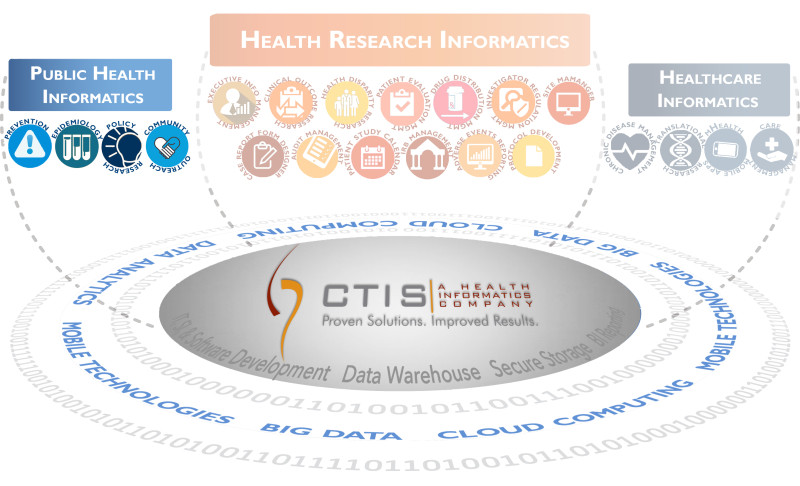Public health is a vital component of our health ecosystem. At CTIS, we believe that a robust public health model is the key to improving individual and population health outcomes, reducing the chronic disease burden, and the elimination health disparities. We apply informatics solutions to public health to ensure that the right technologies are used to enable more effective monitoring and surveillance activities, support enhanced decision-making, and improve timely delivery and analysis of quality data. Our solutions build links across isolated public health domains by forming opportunities for interoperable information pathways. Eventually, our public health informatics solutions will empower disease interventions and prevention—leading to better health of the communities in which we live. We are proud to be leaders in health policy research, working with clients such as the National Institute on Minority Health and Health Disparities (NIMHD) on the Health Policy Research Consortium (HPRC) grant. Our firm provides solutions for better information integration across the health ecosystem. We develop IT solutions that develop a clearer understanding of populations through surveillance, enhanced infrastructure, and information exchange through systematic application of information technology to public health practice, research, and learning.

Capabilities
CTIS’ public health expertise has centered on several key goals aimed at improving the design, execution, and management of epidemiological studies across various health outcomes and diseases. The need for the aggregation of quality health-related data as a key factor to the success of all public health initiatives is at the foundation of CTIS’ public health work in this area.
- Observational studies and surveys
- Scientific analysis and data processing support
- Survey design and recruitment
- Survey conduction using web and mobile devices
- Analysis and data processing support
- Community-based participatory research
- Adaptive research (for unique populations, rare diseases, and repurposed drugs)
- Registries and surveillance
- Early detection and prevention
- Wellness
- Adaptive rehabilitation
Public Health Surveillance
One of the goals of public health surveillance is to monitor and clarify the epidemiology of health problems to inform health policy and responsiveness. CTIS’ ability to meet the informatics demands of public health surveillance ensures that the right health information is available on demand, at any place, and at any time. CTIS’ surveillance solutions utilize an architecture that is independent of disease type (cancer, infectious disease, heart, etc.) and health sector (public health, clinical research, medical treatment). The following observational studies demonstrates the capability of CTIS’ technologies to meet data source and collection needs across disciplines.
- Project 1. Disadvantage in the Food, Built, and Social Environments: A study of cardiovascular health (The CVD Study)
- Policy science construct: Food, Built and Social (FBS) Environment
Cardiovascular disease (CVD) is the leading cause of death in the United States. Researchers have typically explained cardiovascular disease at the behavioral and physiological levels. Our mixed methods study, conducted in collaboration with consortium scientists at the Center for Health Equity (CHE) at the University of Maryland’s School of Public Health, is currently investigating the relationship between CVD and the food, built, and social (FBS) environments. We will test the idea that the places where people live, eat, work, learn, and play could either protect or promote cardiovascular health. We hypothesize that FBS environments work together to either directly affect the burden of heart disease, or to indirectly influence the behaviors that lead to poor cardiovascular health.
- Project 2. The Health Policy Literacy Study: Bridging the Gap between Community, Science and Policy
Policy science construct: Health Policy Literacy (HPL) As the paramount stakeholders in policy efforts designed to improve health outcomes and reduce health disparities, community members stand to gain or lose the most. While much is known about the important role of community in health care research, less attention has been given to understanding the role of community in health policy research and health policy development. The Health Policy Literacy Study (HPLS), conducted in collaboration with consortium scientists at the Morgan State University (MSU) School of Community Health and Policy, uses a mixed methodology to develop and test a tool, the Health Policy Literacy Questionnaire (HPLQ), for understanding what community members know about health disparities and related policies and how they use that information. The MSU team will use an innovative Community-Based Intervention (CBI) to test the HPLQ, demonstrate how to improve health policy literacy (HPL), and apply HPL to a real-world setting designed to address a specific policy outcome and bridge the gap between community residents, researchers, and policymakers. The study will test the primary hypothesis that HPL has a direct and positive impact on civic engagement, and test the secondary hypothesis that the CBI increases HPL. Final reporting will include a Policy Literacy Index that allows comparison of HPL across geography, socioeconomic status, and other key variables. The findings will be used to support the development of education and training initiatives to promote health policy literacy for community stakeholders and policymakers.
Project 3. Patient Portals and Quality of Care (PPQC): A study of portal use in Morgantown, West Virginia; and Baltimore City, Maryland
The use of digital technology, such as online patient portals, has grown rapidly over the past several decades as the Internet has become a crucial tool for health care-related communication and health management. The overarching goal of HPRC’s Patient Portals and Quality of Care (PPQC) study is to advance health disparities research on portal use by rigorously examining patient portal utilization and variations among patient subgroups in urban and rural settings, which few studies have done. The PPQC study will examine the impact of patient portal use on adult patients’ quality of care provided by West Virginia University Medicine Health System (WVUM) in Morgantown, West Virginia and Total Health Care (THC) clinics in Baltimore City, Maryland. The aim is to determine the sociodemographic disparities in and barriers to portal use. By doing so, our goal is to add empirical evidence on patient’s engagement in their health by identifying the determinants of and barriers to portal use in urban and rural settings.
Clients







